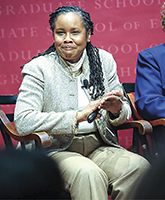Governing in the Wake of Upheaval: Lasting Lessons From Katrina
October 01, 2020
A RESEARCHER FINDS APPLICABLE LESSONS FOR LEADING EXTRAORDINARY RENEWAL IN SCHOOLS TODAY FROM THE UNPRECEDENTED DISASTER IN NEW ORLEANS

In most years, this is the time when people start feeling settled into the new school year.
Principals, teachers and students have the lay of the land as everyone works to reach benchmarks for staff and student learning needs and, in some cases, address the hurdles emerging to achieve those goals.
Of course, this year is unlike
any previous year. Many of us now wonder whether it will be possible ever again to feel settled into school given the upheaval of the COVID-19 pandemic. Beyond simply being settled in, will it be possible to achieve the best of results in our schools?
This is the same question every educator in New Orleans public schools likely was asking a few months into the 2005-06 school year after Hurricane Katrina struck with brutal force, killing 1,200 people, leaving thousands stranded and destroying
core infrastructure and residences for hundreds of thousands of New Orleanians.
This Content is Exclusive to Members
AASA Member? Login to Access the Full Resource
Not a Member? Join Now | Learn More About Membership
Leveraging Good Governance at a Cabinet Meeting
Visualize your next meeting of the superintendent’s cabinet or maybe a gathering of your district’s principals. The agenda of pressing items is in front of you. The heads of offices or schools are sharing their work, successes and
current challenges.
Important decisions are being made — about student learning, teacher professional development, school improvement, parent engagement and community partnerships. Now think about how the three central governance questions
posed in the accompanying article might guide the conversation.
Listen carefully for how goals have been set, who was involved and how. Are new learning standards not being embraced at one or more schools? Maybe offer advice related to setting
meaningful, motivating and nested goals to help staff become more engaged in the work at hand. Maybe using cooperative or consensus governance at the school level would help teachers, as well as students and families, buy into goals.
Has progress
toward planned school improvement goals stalled? Revisit what the original plan was, what strategy was set (if there was one). Were regular check-ins built into the work? Ask questions to determine whether the right structures are in place and whether
possible partnerships have been forged. Does the plan need to go back to the drawing board?
As the meeting wraps up and there is a discussion about next steps, perhaps be a critical friend pushing the group to consider whether the appropriate
activities and amount of labor have been specified. Help people think about how they and you can ensure the right resources and expertise are brought to bear.
In the end, good governance is about good school leadership — at every level,
on an ongoing basis. The three guiding governance questions and 10 principles are a concrete foundation on which to not only build a strong school system for the long run. They also are the foundation for building good governance into the everyday work
of running great schools.
— EBONY BRIDWELL-MITCHELL
Advertisement
Advertisement
Advertisement
Advertisement



